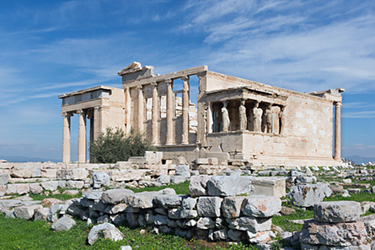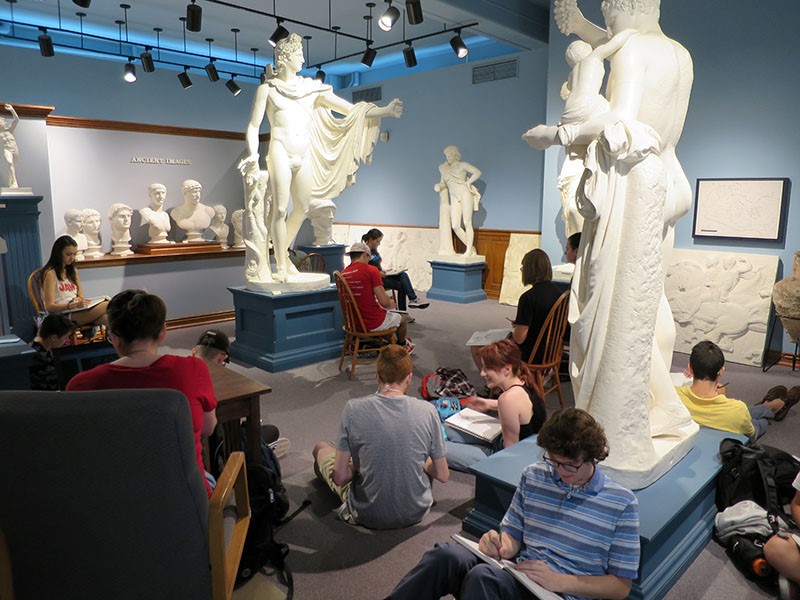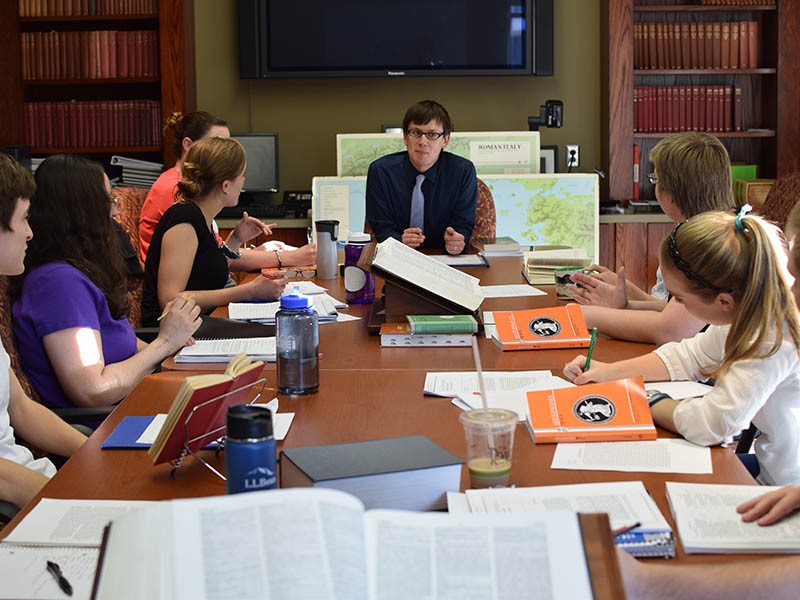Ancient Greek
Why Ancient Greek?
 τοσοῦτον δ᾽ ἀπολέλοιπεν ἡ πόλις ἡμῶν περὶ τὸ φρονεῖν καὶ λέγειν τοὺς ἄλλους ἀνθρώπους, ὥσθ᾽ οἱ ταύτης μαθηταὶ τῶν ἄλλων διδάσκαλοι γεγόνασι, καὶ τὸ τῶν Ἑλλήνων ὄνομα πεποίηκε μηκέτι τοῦ γένους ἀλλὰ τῆς διανοίας δοκεῖν εἶναι, καὶ μᾶλλον Ἕλληνας καλεῖσθαι τοὺς τῆς παιδεύσεως τῆς ἡμετέρας ἢ τοὺς τῆς κοινῆς φύσεως μετέχοντας.
τοσοῦτον δ᾽ ἀπολέλοιπεν ἡ πόλις ἡμῶν περὶ τὸ φρονεῖν καὶ λέγειν τοὺς ἄλλους ἀνθρώπους, ὥσθ᾽ οἱ ταύτης μαθηταὶ τῶν ἄλλων διδάσκαλοι γεγόνασι, καὶ τὸ τῶν Ἑλλήνων ὄνομα πεποίηκε μηκέτι τοῦ γένους ἀλλὰ τῆς διανοίας δοκεῖν εἶναι, καὶ μᾶλλον Ἕλληνας καλεῖσθαι τοὺς τῆς παιδεύσεως τῆς ἡμετέρας ἢ τοὺς τῆς κοινῆς φύσεως μετέχοντας.
“So far has Athens left the rest of mankind behind in thought and expression that her pupils have become the teachers of the world, and she has made the name of “Greece” distinctive no longer of race but of intellect, and the title of “Greek” a badge of education rather than of common origin.” Isocrates, Panegyricus 50 (offsite)
Ancient Greek is the language of the great Homeric epics, The Iliad (Wikipedia) and The Odyssey (Youtube); of the tragedies (Youtube) of Sophocles and Euripides, such as Oedipus Rex, Medea, and Antigone; the philosophical masterpieces of Plato (Youtube) and Aristotle (offsite); the lyric poetry of Sappho (offsite) and Alcaeus (Wikipedia); of the Christian New Testament (Wikipedia); and of early doctors and scientists, including Archimedes (BBC) and Galen (Youtube). By choosing to take Ancient Greek at KU, you will be able to read all of these authors – and more! – in the original language, allowing you to experience first-hand the poetry and power of texts that have gripped generations of readers for two millennia or more.
In addition to this rich literary tradition, Ancient Greek was also the spoken language of the peoples of mainland Greece, the Aegean islands, and Asia Minor, and, after the conquests of Alexander the Great (BBC), of large chunks of Asia, Africa, and Europe (Wikipedia). This means that there is a great wealth of material written on papyrus or carved into inscriptions and dealing with everyday life 2000+ years ago. In fact, archaeologists unearth more and more every year! By learning Ancient Greek, you can come face-to-face with Spartan soldiers (offsite), Hellenistic queens (offsite), and Bactrian traders (offsite) – reading how they thought about themselves and the world around them in their own words.
As well as allowing you to experience the life and culture of the ancient world, studying Ancient Greek can help you to understand contemporary scientific and medical vocabulary, as well as teaching you more about how languages work and how they change over time. The majority of English scientific and medical vocabulary comes straight from Ancient Greek (e.g. hypothermia = hypo “under” + thermia “heat”). By learning the Greek building blocks of modern words, you can understand the meanings of new technical terms even if you’ve never seen them before! The chronological reach and geographical spread of the Ancient Greek language, meanwhile, means that it exists in a large number of different dialects. Comparing the dialects of different places and periods allows us to trace how languages change over time and space and helps us to understand more about how languages work in general.
Image: The Erechtheion, Athens
Ancient Greek at KU
 Ancient Greek (GRK) is offered at all levels by the Department of Classics. Most students arrive at KU with no prior knowledge of Ancient Greek, so if you’ve ever thought about trying out a new language, this is the perfect place to start!
Ancient Greek (GRK) is offered at all levels by the Department of Classics. Most students arrive at KU with no prior knowledge of Ancient Greek, so if you’ve ever thought about trying out a new language, this is the perfect place to start!
In addition to our comprehensive Ancient Greek language program, the Department of Classics also runs Classics (CLSX) courses in translation on the literature, history, and archaeology of Ancient Greece – for example “CLSX 148 Greek and Roman Mythology” and “CLSX 151 Introduction to Classical Archaeology.” We also have a thriving MA program offering advanced course work in the languages and cultures of ancient Greece and Rome. The Department also runs the Wilcox Classical Museum, where you can find original artifacts from the ancient world as well as reproductions of some of the most famous works of Greek art. The wide range of courses and resources available at KU offer a unique opportunity to gain a full understanding of the language, literature, and culture of an ancient civilization. For more detailed information, please refer to the Classics Department's website.
Image: KU students at the Wilcox Classical Museum
Courses Offered and Degree Paths
Our Ancient Greek courses represent a comprehensive language program, from beginner to graduate level. If you have not studied Ancient Greek before, you can start by enrolling in our beginners’ course, GRK 104/105 Elementary Ancient Greek. This course will introduce you to the alphabet, grammar, and core vocabulary of Ancient Greek, allowing you to begin to read original texts from authors such as Plato and Homer in your second semester of the language (GRK 108/109 Ancient Greek Readings and Grammar). If you have studied Ancient Greek before and would like to continue to learn more about the language and literature of Ancient Greece, please contact Prof. Craig Jendza for advice on placement. Courses in Greek contribute towards the Department of Classics’ degrees in Classical Languages and Classical Antiquity, as well as towards obtaining a minor in either of these fields.
Always check the KU Course Catalog for most up-to-date listings.
Resources
 For more information about opportunities to learn about Ancient Greek language and culture at KU, please consult the following:
For more information about opportunities to learn about Ancient Greek language and culture at KU, please consult the following:
- KU Classics Department
- Wilcox Classical Museum
- KU Classics Department (Facebook)
- KU Classics Department (Twitter)
- KU Classics Club
Image: A Greek language class at KU